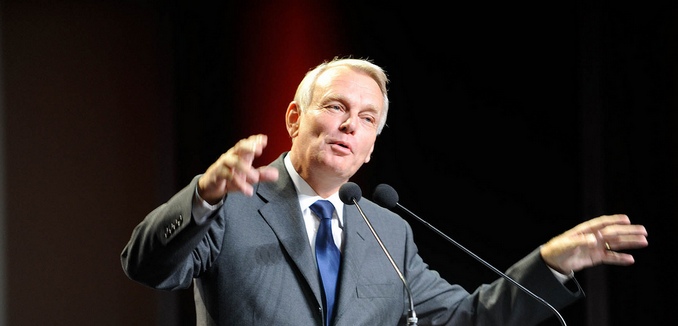French Foreign Minister Jean-Marc Ayrault announced on Thursday that an international conference to discuss possible parameters for a peace agreement between Israel and the Palestinian Authority will be held on June 3 in Paris. A previously planned conference for May 30 was scrapped when Secretary of State John Kerry said that he could not attend.
“We reviewed again the position concerning France’s initiative to hold a ministerial-level meeting in Paris to relaunch the Middle East peace process,” Ayrault told reporters. He added that he foresaw the possibility “for Israel and the Palestinians to resume [talks] on the basis of a two-state solution.”
Noting that Israel had previously made peace with Egypt and Jordan as the result of direct, bilateral negotiations, Israeli Prime Minister Benjamin Netanyahu said on Sunday that “any other attempt only makes peace more remote and gives the Palestinians an escape hatch to avoid confronting the root of the conflict which is non-recognition of the State of Israel.”
“They simply avoid negotiating with us as part of their desire to avoid resolving the root of the conflict, which is recognizing the national state of the Jewish People, i.e. the State of Israel,” Netanyahu added.
The Israeli premier also criticized France for supporting a recent UNESCO resolution that ignored centuries-old Jewish ties to the Temple Mount, adding that this “[cast] a shadow on the fairness of any forum that France tries to convene.” French President Francois Hollande said last week that his government’s support for the resolution was a “misunderstanding,” and pledged not back a similar initiative in the future.
Despite the recent cabinet shuffle, with Yisrael Beytenu head Avigdor Liberman expected to replace Defense Minister Moshe Ya’alon, who announced his resignation today, the Israeli government says it’s still committed to a two-state solution.
However, Palestinian leaders have a history of rejecting or undermining direct talks with Israel.
Abbas last month rejected in invitation by Netanyahu to meet and discuss ongoing Palestinian incitement against Israel. In March he refused to consider a new American peace proposal made to him by Vice-President Joe Biden.
In 2008, Israeli Prime Minister Ehud Olmert presented Abbas with a proposal for a peace agreement, which Abbas rejected. In an interview a year later, Abbas said he refused the offer because “the gaps were wide.” (Abbas again admitted his rejection of Olmert’s offer last year.)
In March 2014, Israel accepted Secretary of State John Kerry’s framework for continued peace negotiations and agreed to proceed on the basis of it, while Abbas rejected it and the next month formed a unity government with the Iran-backed terror organization Hamas.
In September 2015, Netanyahu stated that he was willing to restart talks at anytime without preconditions. The chief Palestinian negotiator, Saeb Erekat, responded by calling Netanyahu’s bid a “PR stunt” and rejected the offer.
The French initiative comes as the Palestinian Authority is under increased scrutiny for paying salaries to convicted terrorists and engaging in incitement to violence, raising questions about its commitment to peaceful coexistence with Israel.
Continued and sometimes violent infighting, an inability to establish a single government, and ongoing corruption also raise questions as to whether the Palestinian Authority is capable of running a state.
[Photo: Jean-Marc Ayrault / Flickr ]




